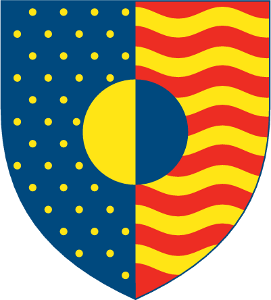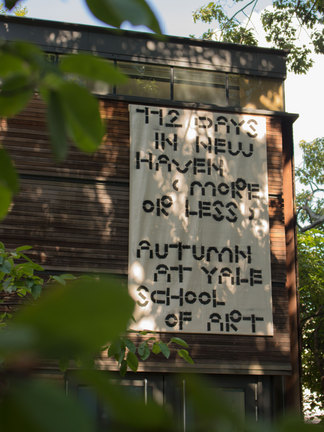 Yale University School of ArtYale School of Art
Yale University School of ArtYale School of Art1156 Chapel Street, POB 208339
New Haven, Connecticut, 06520-8339
(203) 432-2600
 Yale University School of ArtYale School of Art
Yale University School of ArtYale School of Art
All lectures and events take place at E.I.K., 36 Edgewood Avenue, New Haven, CT, and are free and open to the public.
Darby English, author of such important books as How to See A Work of Art in Total Darkness (MIT Press, 2007), engages in a discussion on the topic of his most recent book 1971: A Year in the Life of Color (University of Chicago Press, 2016), with Mark Gibson, Yale School of Art’s Assistant Dean for Student Relations. English’s book explores the role that a political movement can play in an artistic movement, specifically speaking to the Civil Rights movement of the 1960’s and how that influenced the “Black Art Aesthetic” of the 1970’s. Discussion will also explore the role that abstraction plays in describing the Black Experience, and what roles institutions play in curating the “Black Art Aesthetic.”
Darby English is the Carl Darling Buck Professor of Art History at the University of Chicago and Consulting Curator at MoMA. Full information >>
Author of Anywhere or Not at All: Philosophy of Contemporary Art (Verso, 2013) and director of the Centre for Research in Modern European Philosophy in London, Peter Osborne approaches how the field of contemporary art since the 1960s has been characterized by both the attempted dissolution and the reflective expansion of the concept of artistic form. According to Osborne, “recently, in the wake of the revisionist historiography of the exhibitions of that time, the motif of something ‘becoming form’ has been revived and applied in new critical contexts. What, if anything, delimits this expansion of the concept of artistic form? Might it be extended all the way to the crisis-ridden form of historical present? How today might we conceive crisis as form?”
Peter Osborne is Professor of Modern European Philosophy at Kingston University London. Full information >>
Author of Civil Imagination: The Political Ontology of Photography (Verso, 2012) and The Civil Contract of Photography (MIT Press, 2008), Ariella Azoulay focuses her research on how history is told through visual mediums — photographs, film, drawings, and other visual elements — and how these provide a level of detail and context not provided solely by the written word. In her lecture at the Yale School of Art, Azoulay will use the 1950s text A Woman in Berlin as a point of departure for tracing the visual record of a massive rape that took place at the end of World War II, creating a key to read certain photographs previously overlooked as related to rape.
Ariella Azoulay is Professor of Modern Culture and Media and Comparative Literature at Brown University. Full information >>
Poet, author, essayist and playwright, Claudia Rankine addresses The Racial Imaginary Institute (TRII), which she co-founded in 2016 to seek to change the way we imagine race in the U.S. and internationally by lifting up and connecting the work of artists, writers, knowledge-producers, and activists with audiences seeking thoughtful, innovative conversations and experiences. Rankine will consider how issues of white dominance are expressed through the visual arts by looking at artists such as Alexandra Bell, Nona Faustine, Toyin Ojih Odutola, Hew Locke, and others.
Claudia Rankine is a Chancellor of the Academy of American Poets and the Frederick Iseman Professor of Poetry at Yale University. Full information >>
Author of Social Works: Performing Art, Supporting Publics (Routledge, 2011), Shannon Jackson speaks about what it means to assemble in public in our present moment — and to assemble public sector systems. Is there a relation between the public appearance of the former and the systematic operations of the latter? Assembly recalls theories of democracy and freedom as well as modern and contemporary art movements of assemblage. It also invokes industrial (and post-industrial) processes of production, arrangement, service, and labor. Can the re-imagining of Public Re-Assembly help us to re-imagine how social practice is performed?
Shannon Jackson is a professor and researcher focusing on collaborations across art forms and the role of the arts in social change. In addition to several faculty appointments at UC-Berkeley, she is also Associate Vice Chancellor for the Arts + Design. Full information >>
© 2016 - Feedback - About this site - This website is a wiki. All School of Art grad students, faculty, staff, and alums have the ability to change most of this site’s content (with some exceptions); and to add new content and pages. Content is the property of its various authors. When you contribute to this site, you agree to abide by Yale University academic and network use policy, and to act as a responsible member of our community. In this way, we hope the content of this site reflects the unique vitality of our school.
[ Home // About This Site // Admissions // Alums // Calendars // Courses // Current Students // Facilities // Faculty and Staff // Gallery // Recent Changes // Study Areas // Summer Programs // Undergraduate // Visiting // Everything Else // Contact ]